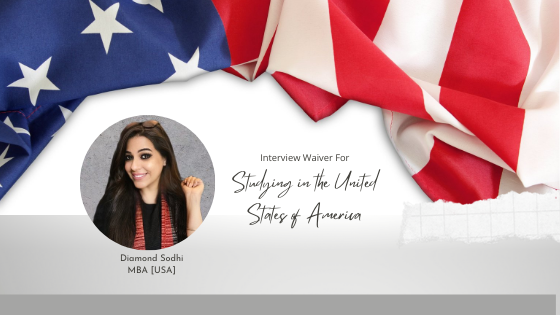
The US has been a prized destination for Indian students looking to further their education abroad. However, of late, Canada has been attracting more students with India being the number one source country for college students in Canada by a large margin. China, has been sitting in a comfortable second position, though far behind India.
Since an Interview session was mandatory in the US Embassy, students specially from Punjab shy away from a personal interview with the Visa Officer and give in to the myth that a visa that does not warrant them to personally appear for the Interview is an easy one to get.
The recent updates released by the US announces the following changes, received with immense fervour:
- The in-person interview for many international student applicants will be waived through 2022, beginning in the Spring 2022
- US consular officers evaluating students’ visa applications are being asked to keep in mind students’ relatively lower ability to prove they intend to return to their home country after their visa expires
This comes as a huge deviation from the current norms the US Consulate officers refer to while evaluating the merits of a Student [F, J and M] visas. The new latitude in determining students’ intentions for coming to the US, may lead to fewer students being denied visas to study in the US.
With the relaxation in the visa policy some students with weaker proof of “residence in India” such as a younger lower age, lower likelihood of owning property or being married, and limited or no work experience stand fairly good chances of being assessed as meeting the eligibility criteria for the grant of the popular F-1 [Student] visa.
Karin Fisher writes for the Chronicle of Higher Education that, “Prior to the pandemic, about a quarter of all student-visa applications were denied. In nine out of 10 non-immigrant visa denials, the reason cited is applicant intent. Now, consular officials are being directed to adjudicate students’ applications “based on present intent – not on contingencies of what might happen in the future, after a lengthy period of study in the United States.”
The NAFSA and American Council of Education executives’ take states , “ It is normal and fitting for some international students to want to both study and then remain in the US after studies – and that allowing talented international students to declare upfront their “dual intent” would, in fact, be in keeping with President Biden’s stated goal of encouraging the most talented international students and skilled foreign workers to remain in the US.”
Before we jump the gun with the presumption that an interview waiver would be the new norm for a US student visa until December 2022, the US has clarified that the embassies and consulates may still require an in-person interview on a case-by-case basis and dependent upon local conditions.
A word of caution- the authorization to waive an interview does not apply to applicants who have a previous refusal that was not subsequently waived or overcome, according to the information published by the ICEF Mentor.
In The US Embassy inIndiastatesthat the interview waiver [Dropbox] appointments for Spring 2022 will allow qualified applicants to make use of the new interview waiver authority. Due to reduced staffing and numerous pandemic-related disruptions to their operations since March 2020, appointment demand is high across all visa categories and wait times may be lengthy for most routine non-immigrant visa appointments at the U.S. Embassy New Delhi and the consulates in Chennai, Hyderabad, Kolkata, and Mumbai.
Following visa applicant may use the expanded interview waiver program:
- Those applying in the F, H-1, H-3, H-4, non-blanket L, M, O, P, Q, and academic J visa categories [secondary and university students, professors, research scholars, short-term scholars, or specialists]
- Those who have previously been issued ANY class of U.S. visa
- Those who have not been previously refused a U.S. visa,
A cherry on the pie here- those who also use the interview waiver program if you are renewing any visa (including B1/B2 visas) within 48 months of expiration.
The US Embassy further clarifies that once interview waiver [Dropbox] appointments become available, applicants with existing in-person appointments will need to cancel their in-person appointments before they will be able to book interview waiver appointments. However, they do not guarantee that applicants with existing in-person appointments will be able to obtain interview waiver [Dropbox] appointments, once available.
Finally, the updates come with a hike in the visa application fee for F, M, and J visas to USD$245, a 53% increase from the current USD$160 that students must pay.
Disclaimer: The contents in the Article above has been based upon the information published by the. U.S. Embassy and Consulates India, ICEF Mentor, and Chronicle of Higher Education,
